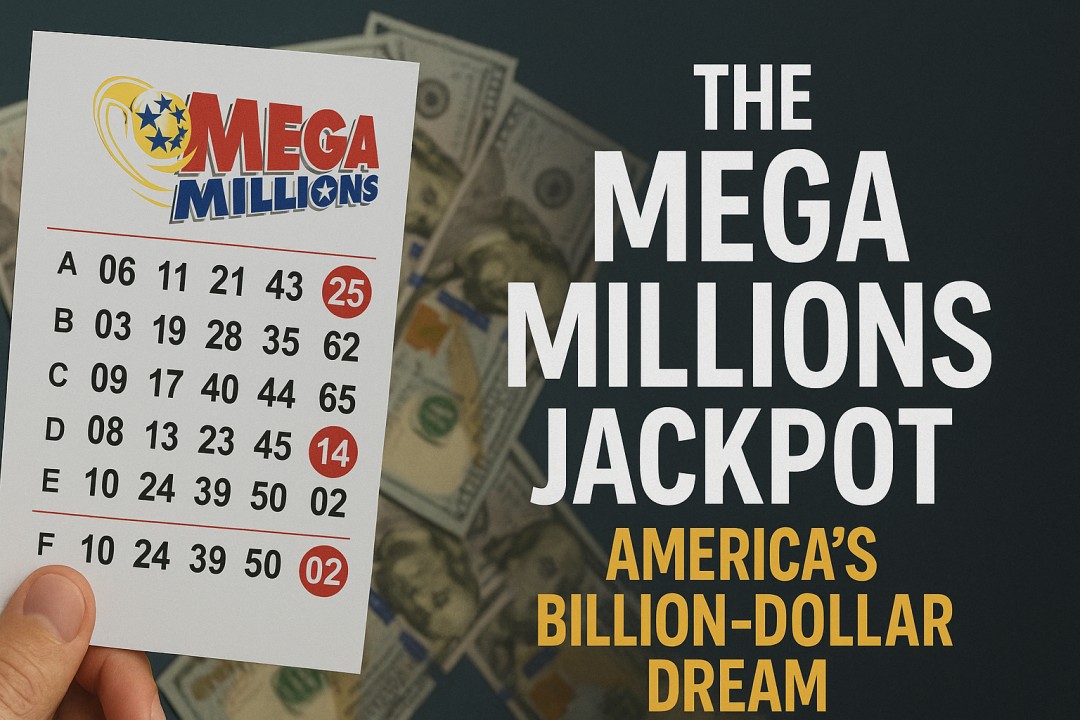The Mega Millions Jackpot: America’s Billion-Dollar Dream
The Mega Millions lottery represents one of the most captivating phenomena in American consumer culture—a nationwide game of chance that transforms ordinary citizens into overnight billionaires while simultaneously funding public services and fueling dreams across economic divides. As of November 2025, the current jackpot run reached a staggering $980 million before a single winning ticket was sold in Georgia on November 15, 2025, marking the eighth-largest prize in the game’s history and the biggest jackpot since major game changes were implemented in April 2025. This massive windfall underscores both the allure and complexity of America’s most prominent lottery game, which has evolved from a modest state-level gambling operation into a multi-billion-dollar enterprise that touches nearly every aspect of American economic and social life.[1][2]

Hand holding a Mega Millions lottery ticket and US dollars in a retail setting
For U.S. citizens, the Mega Millions jackpot is far more than a simple lottery—it embodies the persistent mythology of the American Dream, offering a tantalizing path to instantaneous wealth in an era of growing income inequality and diminishing economic mobility. With tickets now priced at $5 following significant rule changes in 2025, Americans collectively pour billions of dollars into this pursuit annually, driven by psychological factors that range from optimism bias and the gambler’s fallacy to genuine financial desperation. Understanding the Mega Millions phenomenon requires examining not just the mechanics of the game itself, but also its profound economic impact on state budgets, the psychological drivers that compel participation despite astronomical odds, the fiscal realities facing winners, and the broader cultural implications of a society increasingly captivated by the prospect of unearned, life-altering wealth.[3][4]
The Evolution and Mechanics of Mega Millions
Game Structure and Recent Changes
Mega Millions underwent substantial transformations in April 2025, fundamentally altering the game’s structure to create larger jackpots and more attractive prizes for players. The starting jackpot increased dramatically from $20 million to $50 million, positioning the game as a “fast track” to billion-dollar prizes. Players now select five numbers from a pool of 1 to 70 (the white balls) and one Mega Ball number from a pool of 1 to 24—a reduction from the previous 25 Mega Balls, which slightly improved the odds of winning the jackpot from 1 in 302,575,350 to 1 in 290,472,336.[5][6][7][8]
The most significant change involved the ticket price and prize structure. The cost per play increased from $2 to $5, but this higher price now includes a built-in multiplier feature that was previously optional. Every ticket is automatically assigned a random multiplier of 2X, 3X, 4X, 5X, or 10X at the time of purchase, which applies to all non-jackpot prizes. This means that matching all five white balls (without the Mega Ball) can now yield prizes ranging from $2 million to $10 million, depending on the assigned multiplier. The game also eliminated “breakeven” prizes, ensuring that every winning ticket pays out at least twice the ticket cost—for example, matching just the Mega Ball alone now awards $10 to $50, compared to the previous $2 prize.[9][10][11][7][8][5]
These changes reflect a broader industry trend toward creating more excitement and media attention through larger, faster-growing jackpots. Drawings occur twice weekly on Tuesday and Friday evenings at 11 p.m. Eastern time, and the jackpot continues to roll over and grow until someone matches all six numbers. The overall odds of winning any prize improved from 1 in 24 to 1 in 23.07, making Mega Millions slightly more favorable than its primary competitor, Powerball.[2][11][6][12][13]
How the Game Compares to Powerball
While Mega Millions and Powerball dominate the American lottery landscape, they differ in several key aspects that influence player choice. Powerball tickets cost just $2 (versus Mega Millions’ $5), but the optional Power Play multiplier requires an additional $1. Powerball draws occur three times weekly (Monday, Wednesday, and Saturday) compared to Mega Millions’ two weekly drawings, providing more frequent opportunities to play. However, Mega Millions offers a higher starting jackpot ($50 million versus Powerball’s $20 million) and slightly better jackpot odds (1 in 290.5 million versus 1 in 292.2 million).[14][15][16][13]
The prize structures also differ meaningfully. Mega Millions’ built-in multiplier applies to all non-jackpot prizes and can reach 10X regardless of jackpot size, whereas Powerball’s Power Play only offers the 10X multiplier when the jackpot is under $150 million. Additionally, Powerball’s Power Play does not multiply the second-tier prize (matching all five white balls), which remains capped at $2 million, while Mega Millions’ multiplier can boost this prize to $10 million. Despite these differences, both games have produced astronomical jackpots, with Powerball holding the all-time U.S. lottery record of $2.04 billion won in November 2022, and Mega Millions achieving its largest prize of $1.602 billion in August 2023.[2][17][14]
The Mathematics of Impossibility: Understanding the Odds
Jackpot Probabilities and Expected Value
The odds of winning the Mega Millions jackpot—1 in 290,472,336—represent a probability so remote that the human brain struggles to comprehend it meaningfully. To put this in perspective, a person is statistically more likely to be struck by lightning, attacked by a shark, or become a movie star than to win the Mega Millions jackpot. Despite these nearly impossible odds, millions of Americans purchase tickets whenever jackpots grow large, a phenomenon that reveals fundamental limitations in how humans process extremely low-probability events.[6][18][19][20]
Mathematical analysis of expected value—the average return on investment per ticket—reveals the economic irrationality of lottery play. One detailed calculation showed that for a $40 million minimum jackpot (before the 2025 changes), the expected value per $2 ticket was only $0.38, meaning players could expect to lose $1.62 on average for every ticket purchased. Even accounting for larger jackpots, the analysis found that after federal taxes (which reduce winnings to approximately 60% of the advertised amount), a player would need the jackpot to reach nearly $1 billion just to break even—and that’s before considering state taxes and the likelihood of sharing the prize with other winners. With multiple winners increasingly common for massive jackpots, the actual breakeven point climbs to approximately $2.78 billion, far exceeding even the largest jackpots in history.[21]
The overall odds of winning any prize in Mega Millions—1 in 23.07—might seem more favorable, but the vast majority of these wins are minimal prizes barely exceeding the ticket cost. Before the 2025 changes eliminated breakeven prizes, matching just the Mega Ball paid $2 on a $2 ticket, effectively returning the player’s money while generating zero profit. Under the new structure, these small wins pay $10 to $50 on a $5 ticket, providing some positive return but still representing poor odds for meaningful profit.[9][22][12][23][7]
The Psychology of Playing Against the Odds
Why do Americans continue purchasing lottery tickets despite these overwhelming mathematical disadvantages? The answer lies in a complex interplay of cognitive biases, emotional factors, and social influences that override rational economic calculation. Cognitive psychologists have identified several key mechanisms that sustain lottery participation.[19][24][20]
First, the availability heuristic causes people to overestimate winning probabilities based on how easily they can recall examples of lottery winners. Media coverage extensively celebrates winners while ignoring the hundreds of millions of losers, creating a distorted perception that winning is more common than it actually is. Second, probability weighting means people treat extremely small probabilities as if they were much larger—a 1 in 300 million chance gets psychologically processed more like a 1 in 20 chance. Third, the gambler’s fallacy convinces players that previous losses make future wins more likely, when in reality each draw is statistically independent.[24][20][25][26][19]
Beyond these cognitive biases, lottery play serves important emotional and social functions. For many Americans, purchasing a ticket isn’t primarily about winning but about buying hope and the pleasurable experience of imagining what life would be like with sudden wealth. Research shows that people derive significant enjoyment from fantasizing about future possibilities, and the lottery provides a legitimate framework for such daydreaming at a relatively low cost. This “anticipated utility” from imagining winning can outweigh the negative expected value of the ticket itself.[20][19]
Social factors also drive participation. When jackpots reach record levels and dominate news coverage, a phenomenon called “jackpot fever” emerges, characterized by widespread cultural participation and fear of missing out. People who never normally play the lottery suddenly purchase tickets because “everyone else is doing it,” and they don’t want to be the only person who didn’t play when their coworkers or neighbors potentially win. This creates a self-reinforcing cycle: larger jackpots generate more media attention, which drives more ticket sales, which creates even larger jackpots.[4][27][19]
Economic Impact and State Revenue Generation
Funding Public Services Through Lottery Revenue
Mega Millions and other lottery games generate substantial revenue for participating states, with proceeds typically earmarked for public services, particularly education. The Michigan Lottery, for example, contributed more than $1.2 billion to the state’s School Aid Fund in fiscal year 2024, marking the sixth consecutive year of billion-dollar contributions. Since the lottery’s inception in 1972, Michigan has transferred nearly $30 billion to education funding. Similarly, New Hampshire’s lottery profits have grown dramatically, exceeding $207 million in 2024 and comprising almost 17% of the state’s Education Trust Fund expenditures in recent years.[28][29][30]
The revenue distribution from lottery ticket sales follows a consistent pattern across states. Approximately 50% of ticket sales goes to the prize pool, with the remaining 50% divided among retailer commissions (typically around 5%), administrative costs (roughly 3-9%), and contributions to designated public programs (approximately 24-29% nationally). For perspective, in Michigan’s fiscal year 2024, of every dollar spent on lottery tickets, 62 cents went to prizes, 26 cents to education funding, 9 cents to retailer and vendor commissions, and 3 cents to administrative costs.[27][30][28]
This revenue model positions lotteries as a significant but volatile funding source. New Hampshire’s analysis revealed that lottery profits accounted for 29.2% of total lottery revenue transferred to education from 1964 to 2024, though this percentage was higher in earlier decades when the games were newer and less costly to operate. The increasing importance of lottery revenue for education budgets—approaching one-fifth of expenditures in some states—raises concerns about budgetary uncertainty, as lottery participation is sensitive to economic conditions and consumer preferences.[29][30]
Impact on Retailers and Local Economies
The Mega Millions ecosystem extends significant economic benefits to retailers who sell tickets, particularly convenience stores, which account for nearly 70% of all lottery sales nationwide. Retailers typically earn a 5% commission on every ticket sold, and in fiscal year 2024, Michigan lottery retailers collectively earned more than $348 million in commissions. Since 2019, when Michigan’s lottery contributions to education began consistently exceeding $1 billion annually, retailers have earned over $2 billion in commissions.[28][31][32][33]
Retailers who sell winning jackpot tickets receive substantial bonuses that vary by state. Illinois, for example, pays retailers 1% of the jackpot up to a maximum of $500,000, while California caps retailer bonuses at $1 million. When a Des Plaines, Illinois Speedway gas station sold the $1.337 billion winning ticket in July 2022, the store received the maximum $500,000 bonus. In the recent Georgia win, the Publix grocery store in Newnan that sold the $980 million winning ticket stands to receive a significant bonus, though Georgia’s specific bonus structure was not detailed in available reports.[2][34][35][36]
Beyond direct commissions and bonuses, retailers experience increased foot traffic and overall sales when they sell winning tickets, as superstitious players flock to “lucky” locations. The average convenience store earned $2,355 per month in operating income from lottery sales in 2022, including commissions and bonuses. This revenue stream has become crucial for the convenience store industry, with lottery profits at some stores exceeding tobacco sales, historically one of the sector’s most lucrative products.[31][36][33]
The symbiotic relationship between lotteries and convenience stores has deep historical roots. As convenience store numbers exploded from just 900 in 1959 to 71,000 by 1990, state lottery commissions found an ideal distribution network that shared their primary customer base: working-class and middle-class adults, particularly men. In some states, convenience store chains actively lobbied for lottery legislation; 7-Eleven provided 22% of the funding for Virginia’s 1987 lottery referendum and subsequently accounted for over 30% of the state’s lottery sales, earning more than $14 million in commissions in 1991 alone.[33]
Regressive Impact and Equity Concerns
Despite the substantial public revenue generated by lotteries, critics argue that they function as a regressive tax that disproportionately burdens lower-income Americans. Research consistently shows that lottery ticket purchases increase as household income declines, unemployment rises, and poverty rates climb. Marketing for lottery games is deliberately concentrated in neighborhoods with predominantly low-income, Black, and Latino residents. States like Texas, where the minimum wage remains $7.25 per hour, allow workers to purchase $50 scratch-off tickets at check-cashing outlets and pick up Mega Millions tickets alongside groceries at Dollar General stores.[3][37][38][30]
Statistical analysis reveals stark disparities in lottery participation across racial and ethnic groups. According to the Lottery Advertising Association for Consumer Research, 63.9% of Black Americans reported having played the lottery, significantly exceeding both Hispanic (43.8%) and white (41.2%) participation rates. The average adult American spent approximately $320 annually on lottery tickets in 2019, with total U.S. lottery purchases exceeding $105 billion in 2021. However, this spending represents a much larger percentage of income for low-earning households, raising ethical concerns about state governments profiting from gambling by their most vulnerable citizens.[37][29][18]
The philosophical justification for state-run lotteries—that people will gamble regardless, so the state might as well capture the revenue—faces criticism for normalizing and expanding gambling behavior rather than merely redirecting existing activity. Critics note that by this logic, governments could justify selling any vice product, from illegal drugs to other harmful substances. Furthermore, the promise that lottery revenue supplements rather than replaces traditional education funding often proves illusory; states may simply reduce general fund allocations to programs nominally supported by lottery proceeds, resulting in no net increase in total funding.[38][30]
The regressive nature of lottery spending intersects with issues of financial literacy and gambling addiction. Studies show that lottery participation correlates with lower financial literacy, meaning those least equipped to understand the poor odds are most likely to play. For vulnerable individuals, lottery play can escalate into genuine gambling addiction, exacerbating financial hardships and straining personal relationships. New Hampshire’s policy analysis acknowledges these concerns while noting that as lottery revenue approaches one-fifth of education funding, “conversations about its strengths and weaknesses as a revenue source” become increasingly important.[29][37]
The Winner’s Dilemma: Taxation, Payment Options, and Financial Planning
Understanding the Tax Burden
Winning a Mega Millions jackpot triggers immediate and substantial tax obligations that significantly reduce the advertised prize amount. The federal government automatically withholds 24% of lottery winnings over $5,000, but this represents only the initial tax bite. Because lottery winnings are classified as ordinary income, they can push winners into the highest federal tax bracket, with a top marginal rate of 37% applicable to 2025 income. For the recent $980 million Georgia jackpot, federal taxes alone could reduce winnings by more than one-third.[39][40][41][34]
State taxes add another layer of financial complexity, varying dramatically across jurisdictions. Some states, including California, Florida, Texas, and several others, impose no state income tax on lottery winnings, allowing winners to keep more of their prize. Other states levy substantial taxes: New York’s combined state and local taxes can reach 10.9%, while Georgia, where the recent winning ticket was sold, imposes a flat 5.19% state income tax. For the Georgia winner choosing the lump sum option of $452.2 million, state taxes would claim approximately $23.5 million.[34][42][39]
The distinction between the annuity and lump sum options creates dramatically different tax scenarios. If a winner selects the annuity, they receive one immediate payment followed by 29 annual payments, each 5% larger than the previous one to account for inflation. Taxes are assessed annually on each payment, potentially allowing winners to remain in lower tax brackets in some years and benefit from future changes in tax law. Conversely, choosing the lump sum means the winner receives approximately 50-52% of the advertised jackpot immediately, with federal and state taxes due on the entire amount at once.[11][43][40][44][41][21][45]
For the $980 million Georgia jackpot, detailed analysis suggests that after all taxes, the lump sum winner would receive approximately $320-344 million, while the annuity option would deliver roughly $600-650 million over 30 years. However, these calculations assume winners take no deductions and make no strategic tax planning, which rarely reflects reality for ultra-high-net-worth individuals who typically employ sophisticated estate planning and charitable giving strategies to minimize tax liability.[40][46][39][34]
Lump Sum Versus Annuity: Making the Critical Choice
More than 90% of lottery winners choose the lump sum payment over the annuity option, despite financial advisors often recommending the opposite. The preference for immediate cash reflects both psychological factors—the powerful allure of instant wealth—and practical financial considerations about investment opportunities and personal discipline.[43][44][47]
The mathematical argument for taking the lump sum centers on investment potential. If a winner can achieve average annual returns exceeding 5%—the implicit rate at which annuity payments grow—they would accumulate more wealth over 30 years by investing the lump sum than by accepting annuity payments. Historical stock market returns averaging 8-10% annually suggest this is achievable, though not guaranteed. One detailed analysis showed that even after setting aside $25 million for immediate spending from a post-tax lump sum of $45 million, investing the remaining $20 million at 8% annual returns would yield approximately $201 million after 30 years—potentially more than the annuity would provide.[48][43]
However, this argument assumes rational financial behavior and disciplined investing, which research on lottery winners suggests is the exception rather than the rule. The annuity option offers several protective advantages: it provides guaranteed income regardless of investment performance, spreads tax obligations over three decades rather than concentrating them in one year, and most importantly, protects winners from their own potentially destructive spending impulses. Financial advisor Stephen Maggard emphasized this point: “Your greatest risk in this situation is not the math—it’s yourself”.[44][49][47][50][51]
The annuity structure essentially forces financial discipline by limiting access to the full prize amount at once. For winners who recognize they might struggle to refuse requests from friends and family or resist the temptation to overspend, the annuity provides what one advisor called “built-in cover” for saying no to financial requests. Additionally, the annuity’s 5% annual payment increases help protect against inflation, maintaining purchasing power over the three-decade period.[52][49][45][47]
Conversely, choosing the lump sum offers flexibility for major life goals like paying off all debts, funding children’s or grandchildren’s education, establishing charitable foundations, or making transformative investments. Winners who select the lump sum and invest wisely—particularly in tax-advantaged vehicles like municipal bonds—can potentially generate more wealth than the annuity while maintaining liquidity for opportunities and emergencies. The choice ultimately depends on individual circumstances, financial sophistication, and self-knowledge about spending discipline.[47][46][51][44]
The Critical Importance of Professional Guidance
Financial experts universally agree that lottery winners should immediately assemble a team of professionals including financial advisors, tax attorneys, estate planning specialists, and potentially even therapists to navigate the psychological challenges of sudden wealth. The first critical advice: do nothing impulsive. Winners should secure the ticket, sign it to establish ownership, and then take time—days or even weeks—to process the life-changing news before making any major decisions or public announcements.[47][46][53]
Most states have specific claim periods (often 180 days or more) that allow winners time to organize their affairs before redeeming the ticket. During this period, winners should research their state’s disclosure laws to determine whether they can claim anonymously or need to form a legal entity like an LLC or trust to protect their identity. States like Georgia and Illinois allow anonymous claims, while others like New York require public disclosure, making privacy protection strategies essential.[23][54][47]
Common mistakes that lead to financial ruin include failing to account for the full tax burden, making large gifts to friends and family without proper legal structures, purchasing extravagant assets with high ongoing costs (mansions, luxury cars, boats, jets), and falling victim to bad investment advice or outright scams. One of the most insidious challenges is the relentless pressure from others seeking money. Sandra Hayes, who shared a $224 million Powerball jackpot, described friends and family as “vampires” who constantly asked for money and caused emotional pain. Abraham Shakespeare, who won $17 million, told his brother “I’d have been better off broke” due to endless financial requests; he was ultimately murdered by someone who befriended him specifically to access his wealth.[50][46][54]
Professional guidance helps winners develop a comprehensive financial plan addressing immediate needs (paying off debt, establishing an emergency fund), long-term goals (retirement security, legacy planning), philanthropic interests (establishing foundations or donor-advised funds), and lifestyle decisions (appropriate housing, reasonable spending budgets). Advisors recommend creating a separate “fun fund” limited to 10-15% of annual payments or investment returns, allowing winners to enjoy their wealth while maintaining financial sustainability. Critically, winners should avoid visible lifestyle changes immediately after winning—keeping their job for several months, delaying major purchases like luxury vehicles or mansions, and being thoughtful about which relationships to maintain or reconsider.[46][53][51][47]
The Lottery Curse: When Winnings Become Tragedy
Statistical Reality of Winner Outcomes
The phrase “lottery curse” has entered popular consciousness due to numerous high-profile cases of winners whose lives deteriorated dramatically after receiving massive prizes. Research suggests that approximately 70% of lottery winners lose their fortune within 5 to 10 years, while roughly one-third eventually declare bankruptcy. These statistics stand in stark contrast to the fantasy of permanent financial security that drives lottery participation.[50][55]
The reasons for this high failure rate are multifaceted. Many winners experience “Sudden Wealth Syndrome,” a psychological condition characterized by intense stress, anxiety, isolation, guilt, and fear despite—or perhaps because of—their newfound riches. Rather than happiness, many winners report feeling overwhelmed, confused, and uncertain about their identity and relationships. The sudden transformation from ordinary financial circumstances to extraordinary wealth can be psychologically destabilizing, particularly for individuals without prior experience managing significant assets.[55][56][50]
However, more recent and comprehensive research provides a more nuanced picture. A 2018 National Bureau of Economic Research study examining Swedish lottery winners found little evidence supporting the narrative that winners typically spend extravagantly. Instead, substantial prize winners generally experienced long-lasting improvements in their financial situations observable for over a decade post-win. Another Swedish study found that large prize recipients reported higher life satisfaction than non-winners even ten years after their windfall. These findings align with earlier research from 1978 showing no major happiness differences between lottery winners, non-winners, and accident victims who became paralyzed.[18]
The apparent contradiction between these outcomes and the “70% lose everything” statistic likely reflects several factors: sensationalist media coverage that emphasizes dramatic failures while ignoring quiet successes; differences between jurisdictions (Swedish winners may face different social pressures and tax structures than American winners); and the possibility that the most troubled cases receive disproportionate attention, creating perception biases about typical winner experiences.[50][18]
Cautionary Tales and Common Pitfalls
Numerous individual stories illustrate the potential dangers of sudden wealth. Michael Carroll, dubbed the “Lotto Lout,” won nearly £10 million but spent it all on parties, expensive cars, and gifts within eight years, returning to a regular job completely broke. David Lee Edwards won $27 million and rapidly depleted it on mansions, luxury cars, a private jet, and drugs, leaving him impoverished within five years. Janite Lee won $18 million in 1993 and generously supported politics, education, and community causes, but filed for bankruptcy eight years later with only $700 remaining and $2.5 million in debt.[50][57][55]
Perhaps most tragic is the story of Abraham Shakespeare, a Florida man who won $17 million in 2006 and disappeared three years later, ultimately murdered by someone who had befriended him to access his wealth. Jack Whittaker, who won $315 million, later stated “I wish I’d torn that ticket up,” as his life descended into chaos involving family tragedy, thefts, and relentless stress.[57][55][50]
These cautionary tales share common elements: overspending without budgets, poor or speculative investments, pressure from friends and family, substance abuse, lifestyle inflation to unsustainable levels, and vulnerability to scams or unqualified advisors. Winners often underestimate ongoing costs associated with luxury purchases—property taxes, insurance, maintenance, and staff for mansions and yachts can quickly drain wealth even when the initial purchase seems affordable.[46][54][50]
The social dimension of winning proves particularly challenging. Relationships that predated the windfall often become strained or commodified, as friends and family begin viewing the winner primarily as a source of financial assistance. New relationships form under suspicion—does this person genuinely care about me, or are they interested in my money? This dynamic creates profound isolation and loneliness, as winners struggle to distinguish authentic connections from opportunistic ones. Timothy Schultz, who won $28 million at age 21, described feeling like a “walking, talking ATM” and experienced significant damage to family relationships when he learned to say no to financial requests.[58][50]
Characteristics of Successful Winners
Despite the prevalence of cautionary tales, some lottery winners successfully navigate sudden wealth and achieve long-lasting financial stability and life satisfaction. Research and case studies suggest several common characteristics among winners who avoid the “lottery curse”.[50][51][18][58]
Successful winners typically seek professional financial advice immediately and follow it consistently. They create and adhere to realistic budgets that account for taxes, set aside adequate reserves, and limit discretionary spending to sustainable levels. They establish clear financial boundaries with friends and family, learning to say no to requests while potentially setting up structured giving through trusts or foundations that separate personal relationships from financial assistance.[53][51][50]
These winners avoid impulsive lifestyle inflation, making considered rather than emotional decisions about housing, vehicles, and other major purchases. They often maintain or find meaningful work—not for income, but for purpose, structure, and social connection. Timothy Schultz returned to college to study film and broadcast journalism, later producing documentaries and creating a podcast interviewing other lottery winners. He emphasized that sitting on a beach drinking margaritas quickly loses its appeal: “I needed a reason to wake up in the morning and a goal to achieve”.[47][46][58]
Successful winners also demonstrate psychological resilience and self-awareness. They recognize that money doesn’t fundamentally change who they are or guarantee happiness, but rather provides tools, time, and opportunities while reducing stress about debt and survival. They maintain realistic expectations about what wealth can and cannot do, understanding that genuine fulfillment comes from relationships, purpose, and personal growth rather than material possessions.[18][58]
Importantly, winners who thrive often view their windfall as an opportunity to make a positive difference beyond their own lives, establishing charitable foundations, supporting causes they care about, or helping family and community members in structured, sustainable ways. This broader sense of purpose helps counteract the isolation and meaninglessness that can accompany sudden wealth when it’s pursued purely for personal consumption.[46][51][53]
Cultural Significance and the American Dream
The Lottery as American Mythology
The Mega Millions jackpot occupies a unique space in American cultural consciousness, serving as both entertainment and a modern manifestation of the American Dream—the belief that anyone, regardless of background, can achieve extraordinary success. In an era of widening income inequality, stagnant wages, and declining economic mobility, the lottery offers one of the few remaining pathways by which an ordinary person can instantly join the ranks of the ultra-wealthy.[4][38]
This cultural significance intensified during the 1980s and 1990s, coinciding with broader societal shifts. As journalist Jonathan Cohen documented, the period when lotto games transformed the national gambling landscape aligned with deregulation, Reaganomics, the rise of figures like Donald Trump, and media celebration of extravagant wealth through shows like “Lifestyles of the Rich and Famous”. “It was no longer taboo to amass a vast fortune; neither was it offensive to display it,” Cohen observed. “Wealth—not the prosperity of working-class people—became a way to reaffirm the bounty of capitalism”.[38]
The irony is profound: this obsession with unattainable wealth through lottery jackpots coincided with declining financial security for most working Americans. Beginning in the 1970s and accelerating through the 1980s, income gaps widened, job security diminished, pensions eroded, healthcare costs soared, and the longstanding promise that education and hard work would lead to upward mobility became increasingly hollow for children born in those decades. As Cohen noted, “Life mirrored the lottery: for most Americans, winning became more elusive”.[38]
The lottery thus reflects a fundamental shift in American economic mythology—from a belief that steady work and responsible behavior ensure middle-class prosperity, to a fantasy that only extraordinary luck or windfall can escape financial precariousness. This transformation has troubling implications for civic culture and economic policy, potentially undermining support for systemic solutions to inequality in favor of individualistic gambling on miraculous escape.[38]
Media Amplification and Jackpot Fever
The media plays a crucial role in sustaining lottery culture through extensive coverage of large jackpots, creating a self-reinforcing cycle of attention and participation. When jackpots reach record levels, news outlets provide near-constant updates, showing lines at convenience stores, interviewing hopeful players, and speculating about how winners might spend their fortune. This coverage serves as free advertising for lottery games, driving ticket sales that further increase jackpots and generate more media attention.[4][59]
Research confirms that many people who don’t normally play the lottery purchase tickets only when jackpots grow large enough to generate news coverage. The “fear of missing out” becomes powerful: individuals don’t want to be the only person who didn’t play when their office pool potentially wins. This creates what psychologists call “anticipated regret”—a preemptive version of the regret one would feel if others won and they hadn’t participated.[19][24][4]
The sustainability of this model faces questions as billion-dollar jackpots become routine rather than exceptional. “There are only so many times people will be surprised by a billion dollar jackpot, and as billion jackpots become more and more routine, they will be covered less frequently in news, and then this effect will go away,” noted one analyst. However, lottery officials have demonstrated willingness to continually adjust game rules to lengthen odds and create larger, more attention-grabbing prizes, suggesting the escalation may continue.[59][7]
Critics argue this media-lottery complex normalizes gambling behavior and may contribute to broader societal problems, particularly as online gambling and sports betting become ubiquitous. The casual acceptance of spending $5 or $10 on lottery tickets—promoted as harmless entertainment—may lower psychological barriers to more problematic gambling activities. For young people growing up surrounded by lottery advertising and sports betting apps, the line between responsible recreation and harmful addiction becomes increasingly blurred.[3]
Hope, Escapism, and Social Function
Beyond the mathematical calculation of odds and expected value, lottery participation serves important psychological and social functions that help explain its enduring popularity. For many Americans, particularly those facing financial hardship, purchasing a lottery ticket represents buying hope—a tangible symbol that dramatic positive change remains possible, however unlikely. This hope provides emotional relief from stress, debt, and limited options, offering what psychologists describe as a form of escapism that allows temporary mental respite from difficult circumstances.[37][18][19][24]
The act of imagining “what if” generates powerful positive emotions that people are willing to pay to experience. “Nobody expects to win the lottery, but what you’re buying is the enjoyment of thinking about what would happen if you won,” explained psychologist Leaf Van Boven. “It’s more about the enjoyment that people experience when they imagine things that are going to happen in the future, which is a really powerful emotion”. This anticipated utility—the pleasure derived from imagining future possibilities—can exceed the negative expected value of the ticket itself, making lottery play rational from an emotional if not financial perspective.[20]
Lottery participation also serves social bonding functions. Office pools, family groups, and friendship circles that play together create shared experiences and conversation topics. The collective anticipation of drawings and discussion of how winnings would be used strengthens social connections and provides entertainment beyond the monetary stakes. In some communities, particularly among African Americans and other groups with higher participation rates, lottery play has become culturally embedded as a form of recreation and social interaction.[26][37]
However, this social dimension cuts both ways. The normalization of lottery spending in certain communities can perpetuate cycles of financial disadvantage, as families already struggling economically allocate scarce resources to gambling rather than savings or investment. The promise of lottery-funded social mobility may distract from collective action to address structural economic inequality, substituting individual gambling for systemic reform.[38][37]
Conclusion: Balancing Dreams and Reality
The Mega Millions jackpot embodies fundamental tensions in contemporary American society—between hope and mathematical reality, between individual dreams and collective welfare, between entertainment and exploitation. As jackpots continue growing larger and rule changes make billion-dollar prizes increasingly common, these tensions will likely intensify rather than resolve.[59][7]
For individual Americans considering whether to play, the evidence suggests several clear conclusions. From a purely financial perspective, lottery tickets represent a poor investment with negative expected value in virtually all circumstances. The odds of winning life-changing amounts remain infinitesimally small, while the predictable outcome is losing the ticket price. Those who do win face substantial risks—approximately 70% lose their fortunes within a decade, and winners frequently experience psychological distress, relationship problems, and targeting by fraudsters and opportunists.[21][50][55][60][61]
However, dismissing lottery play as purely irrational ignores the genuine psychological benefits that many participants derive from the experience. For the price of a ticket, players purchase hope, enjoyable daydreaming, social bonding, and participation in a shared cultural phenomenon. These intangible benefits have real value, even if they don’t appear in expected value calculations. The key is maintaining realistic expectations, setting strict spending limits that don’t compromise financial obligations, and treating lottery play as entertainment rather than investment or financial planning.[47][46][51][18][19][20]
For policymakers and society, the Mega Millions phenomenon raises more complex questions about the appropriate role of government-sponsored gambling. The substantial revenue generated for education and other public services provides genuine benefits, supporting schools that serve millions of students and reducing the need for politically difficult tax increases. However, this revenue comes disproportionately from lower-income citizens, effectively functioning as a regressive tax that most burdens those least able to afford it. The normalization of gambling through ubiquitous lottery advertising may contribute to broader gambling problems, particularly among young people.[3][37][38][28][29][30]
As states become increasingly dependent on lottery revenue—with some jurisdictions funding nearly 20% of education budgets through gambling proceeds—they face difficult ethical and practical questions about sustainability, equity, and the proper relationship between government and vice. The expansion to video lottery terminals and other forms of gambling suggests states will continue seeking new revenue through expanded gaming rather than addressing these fundamental concerns.[29][30]
Ultimately, the Mega Millions jackpot will continue capturing American imagination as long as economic inequality persists and the American Dream of upward mobility remains elusive through conventional means. For many citizens, that $5 ticket represents not foolishness but a perfectly rational recognition that, given structural economic constraints, extreme luck may be their most realistic path to financial security. This sobering reality suggests that debates about lottery policy cannot be separated from broader conversations about economic opportunity, wealth distribution, and what kind of society America aspires to become. Until those fundamental questions find satisfactory answers, Americans will continue lining up at convenience stores, clutching their tickets, and dreaming of that life-changing jackpot that will transform their fortunes overnight.[4][38]
- https://www.megamillions.com/News/2025/Mega-Millions-Jackpot-Raised-to-$980-Million.aspx
- https://www.cbsnews.com/news/mega-millions-single-ticket-holder-jackpot-georgia-980-million/
- https://thehill.com/opinion/finance/4557746-lottery-culture-is-overtaking-america-but-for-most-its-a-losing-bet/
- https://www.bbc.com/news/world-us-canada-64217198
- https://www.mdlottery.com/games/mega-millions/how-to-play/
- https://www.calottery.com/en/new-mega-millions
- https://www.thelotter.us/mega-millions/2025-changes/
- https://www.indiatoday.in/world/us-news/story/mega-millions-rule-changes-bigger-jackpots-higher-prizes-coming-april-2025-glbs-2699626-2025-03-26
- https://www.nmlottery.com/games/mega-millions/how-to-play-mega-millions/
- https://hoosierlottery.com/games/draw/mega-millions
- https://www.megamillions.com/how-to-play.aspx
- https://www.mdlottery.com/games/mega-millions/prize-structure/
- https://www.jackpot.com/blog/lottery-tips/powerball-vs-mega-millions
- https://www.thelotter.com/powerball-mega-millions/
- https://www.lottoland.co.za/magazine/powerball-vs-megamillions.html
- https://blog.jackpocket.com/powerball-vs-mega-millions/
- https://www.nytimes.com/article/lottery-jackpot-record-powerball-megamillions.html
- https://www.yahoo.com/news/the-mega-millions-jackpot-has-grown-to-more-than-1-billion-is-winning-the-lottery-all-its-cracked-up-to-be-143903881.html
- https://www.cnbc.com/2013/12/17/why-do-lottery-players-think-they-can-defy-odds.html
- https://www.colorado.edu/asmagazine/2024/03/20/youre-very-likely-not-going-win-so-why-play
- https://wealthtender.com/insights/odds-of-winning-powerball-mega-millions/
- https://www.mainelottery.com/games/megamillions.shtml
- https://walottery.com/JackpotGames/MegaMillions.aspx
- https://connexontario.ca/blog/why-people-keep-playing-the-lottery/
- https://www.abc15.com/news/state/lottery-psychology-why-do-people-take-chances-even-though-winning-is-so-rare
- https://www.maddyness.com/uk/2024/06/07/the-psychology-behind-why-we-keep-playing-the-lottery/
- https://www.caesar.org/shared/asks/a840cad7-2348-4fcc-9c1a-ee727de3f928
- https://milotteryconnect.com/2024/12/16/michigan-lottery-contributes-more-than-1-2-billion-to-schools-in-2024-sixth-consecutive-contribution-of-more-than-1-billion/
- https://nhfpi.org/blog/the-state-lottery-has-grown-becoming-more-important-for-public-education/
- https://www.investopedia.com/financial-edge/0512/the-good-and-bad-of-national-lotteries.aspx
- https://www.convenience.org/Media/Daily/2023/October/9/3-All-Eyes-on-Lotto_Ops
- https://louisianalottery.com/retailers-guide/
- https://blog.oup.com/2022/10/the-intertwined-history-of-state-lotteries-and-convenience-stores/
- https://www.casino.org/news/heres-how-much-taxes-the-mega-millions-winner-will-pay/
- https://www.businessinsider.com/mega-millions-win-big-illinois-convenience-store-2022-7
- https://www.cbsnews.com/sacramento/news/1-1b-mega-millions-prize-also-can-result-in-a-big-payday-for-retailers/
- https://michiganchronicle.com/the-lottery-and-black-americans-understanding-the-impact-and-trends/
- https://www.newyorker.com/magazine/2022/10/24/what-weve-lost-playing-the-lottery
- https://www.kiplinger.com/taxes/602142/tax-on-mega-millions-jackpot
- https://www.usamega.com/mega-millions/jackpot
- https://www.usatoday.com/story/money/taxes/2025/04/04/winning-mega-millions-odds-improve-taxes/82739213007/
- https://www.cnbc.com/2025/11/13/mega-millions-jackpot-states-with-biggest-payouts.html
- https://www.cnbc.com/2024/09/06/payout-option-experts-recommend-for-mega-millions-jackpot.html
- https://www.annuity.org/selling-payments/lottery/
- https://www.megamillions.com/difference-between-cash-value-and-annuity
- https://www.investmentnews.com/retirement-planning/warnings-from-financial-advisors-grow-with-mega-millions-jackpot/239840
- https://fortune.com/2023/07/12/mega-millions-winners-financial-advice-tips/
- https://www.reddit.com/r/ifiwonthelottery/comments/1ht6iz6/should_mega_millions_jackpot_winners_take_a/
- https://blog.iese.edu/jestrada/files/2025/01/WPost.pdf
- https://www.scratchcards.online/blog/how-many-lottery-winners-go-broke/
- https://www.morningstar.com/news/marketwatch/20251114213/youve-just-won-the-nearly-1-billion-mega-millions-jackpot-here-are-the-5-money-moves-you-need-to-make-next
- https://www.lotteryoffice.com.au/magazine/lottery-winnings-lump-sum-vs-annuity-payout-which-is-better/
- https://www.mintcofinancial.com/best-financial-advisor-for-mega-millions-lottery-winner/
- https://www.foxbusiness.com/lifestyle/top-tips-help-lottery-winners-protect-finances
- https://www.cognizantwealth.com/2013/04/24/sudden-wealth-blessing-or-curse/
- https://windfalladvisors.com/sudden-wealth-syndrome-is-it-real/
- https://www.youtube.com/watch?v=2BCXlJPsQAM
- https://www.businessinsider.com/lottery-winner-powerball-became-millionaire-2024-5
- https://news.northeastern.edu/2023/07/31/mega-millions-billion-inflation/
- https://slate.com/business/2018/10/powerball-jackpot-mega-millions-tickets-odds-difference.html
- https://www.investopedia.com/managing-wealth/worth-playing-lottery/
- https://www.thelotter.com/biggest-mega-millions-jackpots/
- https://www.lotto.net/mega-millions/numbers/2025
- https://www.megamillions.com/jackpot-history
- https://www.lottery.nd.gov/public/games/MegaMillionsWinningNumbersCurrentYear
- https://www.mnlottery.com/games/lotto/mega-millions
- https://www.valottery.com/data/draw-games/megamillions
- https://nclottery.com/mega-millions-how-to-play
- https://en.wikipedia.org/wiki/Mega_Millions
- https://floridalottery.com/games/draw-games/mega-millions
- https://www.oregonlottery.org/jackpot/mega-millions/
- https://qz.com/megamillions-powerball-biggest-jackpots-ever
- https://www.pjstar.com/story/news/lottery/2025/11/14/winning-mega-millions-numbers-drawing-last-night-nov-14-2025-mega-million-lottery-number-tonight/87280681007/
- https://www.taxact.com/tax-resources/tax-calculators/lottery-calculator
- https://www.reddit.com/r/theydidthemath/comments/15je4jw/request_what_would_the_odds_be_of_winning_the/
- https://www.forbes.com/sites/saradorn/2025/11/15/nearly-1-billion-winning-mega-millions-ticket-sold-in-georgia-heres-what-the-winner-takes-home-after-taxes/
- https://www.guyanagraphic.com/op-ed/the-lottery-curse-and-the-oil-windfall-two-tales-of-squandered-wealth/
- https://www.jsmorlu.com/financial-business-guides/mega-millions-financial/
- https://www.youtube.com/watch?v=0S_sot8poCM
- https://www.vox.com/first-person/2018/10/24/18018720/mega-millions-lottery-power-ball-drawing
- https://www.forbes.com/sites/zacharyfolk/2025/11/16/powerball-jackpot-climbs-to-570-million-heres-what-the-winner-could-take-home-after-taxes/
- https://www.linkedin.com/posts/scaleupmoney_sudden-poor-behavioral-activity-7310690545515839488-JxUW
- https://louisianalottery.com/2025-mega-millions/
- https://thehill.com/homenews/ap/ap-u-s-news/states-hope-for-revenue-boost-with-mega-millions-craze/
- https://www.palottery.pa.gov/Draw-Games/Mega-Millions/Mega-Millions-FAQ.aspx
- https://www.facebook.com/groups/medfordnjvoices/posts/2812101832288315/
- https://www.cstorepos.com/blog/how-do-i-become-a-lottery-retailer
- https://economictimes.com/news/international/us/mega-millions-lottery-anyone-win-jackpot-last-night-heres-why-it-hit-680-million-game-changes-how-to-play-where-to-buy-tickets-when-is-next-drawing-mega-millions-lottery-anyone-win-jackpot-last-night-heres-why-it-hit-680-million-game-changes-how-to-play-where-to-buy-tickets-when-is-next-drawing-recent-winners-and-history/articleshow/124741739.cms
- https://www.masslottery.com/about/first-drawing-with-mega-millions-enhancements-is-april-8-2025
- https://www.newstimes.com/news/article/mega-millions-draws-numbers-for-980-million-21189190.php
- https://www.youtube.com/watch?v=hOnEWwYmN9I
- https://www.aol.com/news/winning-lottery-cracked-185408812.html
- https://www.washingtonpost.com/nation/2022/07/29/mega-millions-billion-jackpot-debt-house/
- https://www.linkedin.com/pulse/case-study-why-do-people-play-lottery-indian-context-stpjf
- https://parade.com/news/powerball-vs-mega-millions-key-differences-in-odds-jackpots-and-ticket-prices-explained
- https://www.youtube.com/watch?v=E1_GEpO3otA






![Maneka Gandhi v. Union of India [1978] 2 SCR 621: A Watershed Moment in Indian Constitutional Jurisprudence](https://www.infipark.com/articles/wp-content/uploads/2026/02/Image-Feb-18-2026-10_47_59-AM-218x150.jpg)










